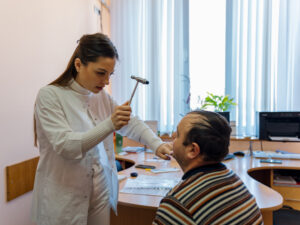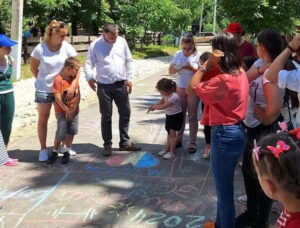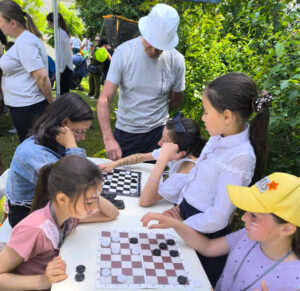« For me the science about the brain was fascinating » – the angle – you see the world as it is!

Medicine is an area that requires not only large knowledge and years of studies, but also empathy, patience and the desire to do good. Silvia Băitoi, a neurologist at the Ungheni District Hospital, found her vocation in this field, although, in childhood, she dreamed of other professions. Originally from a small village in the north of Moldova, it has come to embrace medicine at the urging of the parents, and today it does not imagine another professional path. She tells us about her path, the challenges of the job of a neurologist and the impact that neurological diseases have on patients.
– Where's Silvia Băitoi?
– I am originally from the village of Camenca, Glodeni district, a village from the north of Moldova, a small village with simple people, where less people in it have left. Very hard I broke up with the village, because there are my parents and from there my roots are drawn. Only thinking about my native, do I try some special emotions. I was born into a family of simple and hard-working people. I still have a brother, he's bigger than me. The fact that I finished my studies and became a doctor, for them is a great pride. In my turn, I also enjoy my achievements, which I have obtained through years of studies and a lot of work.
-Did you choose the profession of a neurologist, a profession that is not so easy, what caused you to choose this profession?
– I practically didn't dream of becoming a doctor, because I was the kind of child who aspired to something else. When someone asked me, what I want to become when I was big, I was answering something random, that I would be an actress, artist, then I would say that I will be a policeman. After graduating from high school, my parents suggested that I have to choose a more serious profession and somehow guided me to choose medicine, for which I worship to the ground in front of them. Now looking back, I can't imagine something else than to become a doctor. Studying at the University of Medicine and Pharmacy « Nicolae Testemițeanu », we oscillated between several specialties, but in the end I chose neurology, a complicated domain that I wanted to explore. For me it was fascinating the science about the brain, the way I chose to go, of course.
-Did I understand that in parallel with studies you practiced medicine, was this useful to you?
-Even from the year 4 of the university I have already started working as a nurse, which gave me a greater confidence in work with patients. In order to give the patient trust the patient and find that your advice and practice is good, I have to approach the patient from several points of view, but this does not happen in a day. Continuous exercise is needed to know work in medicine and from another perspective.
-You have chosen to work in a district center, namely in Ungheni, but you have not opted for a medical institution in the capital or even abroad. What consideration did you do?
– I never loved the joke and agglomeration. Respectively, as I worked as a resident doctor in a hospital in the Capital, I lived close to where I was active, so that I do not move through traffic jams, as it usually happens in big cities. I have never asked the problem why to work in a district center. The thought of working in a district medical institution did not disturb me at all, because I wanted to get out of the routine, from the comfort zone and somehow start my life from a different perspective, so that I would later train as a specialist and professional in the field.
– In the career, relatively short in the district of Ungheni, you managed to get the confidence and esteem of patients. How easy is it to interact with different categories of citizens?
– I can't say it's easy, because people are with different characters, with different pathologies. My initial goal was not for the patient to take love to me, but when he gets out of the office to receive useful information, with a proper treatment and with an investigation method to answer many questions so that he would later be chosen with a good result. I believe that each patient requires an individual approach. For example, an older patient needs a simpler, not so sophisticated language to get the information. I strive to be patient, empathetic, to listen to their needs and to be with them. I think this comes from the 7 years at home and even from the mentors I had at the University.
– How is the clinical picture of the neurological diseases of the patients who walk your threshold and what is their incidence at the moment?
– The spectrum of neurological diseases is very diverse, because patients when they come in the cabinet have a wide range of symptoms, some even very complicated and they do not know how to express them. Therefore, it is very difficult to select that symptom from everything the patient says, to fit him in that syndrome so that I can direct him to an investigation, or to an appropriate treatment. Neurological diseases themselves are very complicated, which is why the accusations they present and the neurological examination are important, which helps us a lot to establish a presumptive diagnosis, which could confirm or deny the diagnosis. Unfortunately, the incidence of neurological diseases increases a lot lately, and I believe that this fact is related to the speed with which the world develops. We have many young people who come and have a clinic of a neurological disease, which is very sad from my point of view. There are days when the number of young people exceeds the number of older people.
– What are the causes of triggering neurological diseases?
– Many neurological diseases have no causes and many scientists are continuously studying, which would be these causes. However, I go on the principle that some neurological diseases are somewhat genetically scheduled, and the fact that we develop them in a certain period of life depends on our way of life, how we present ourselves as people and how we interact with society, how we respect some norms that can cause these diseases, among which would be sleep hygiene, physical activity, stress, stress, stress. Most diseases also come because of our negligence, the risk factors that we often do not take into account.
– Why does a neurologist need in his activity, because the correct decisions in some risk situations, play a decisive role in the patient's life?
– Major importance is the ability to classify acute and chronic diseases. A patient when it comes and presents some accusations, we must fit them in an acute disease or a chronic disease. For this reason we have at the door patients who come with a neurological emergency, which we obviously do not let long in a row, but consult them immediately. At the same time, it takes a lot of patience, because patients do not always realize that the doctor needs time to investigate and listen to him. They want now at the time, but this requires time and concentration. At the door they also come with patients with stroke and patients who have symptoms of epilepsy. Each case is examined individually and the right decision is taken immediately.
– Enable in the neurological section of the Ungheni District Hospital. How is it to fit there in the consultative section?
– Most of the time I spend in the consultative section, but for me the hospital section is very important. To say that this combination of activities is very easy, I cannot say with certainty, but I strive to overcome the difficulties, as I never offered anything on the tray, because for all I had to work and make an effort. I think I am lucky that I found in the collective of the neurological section, led by the doctor Veaceslav Săculțanu, a good and kind collective from which I have a lot to learn and take over. I was lucky enough for understanding, empathy and goodwill, both in the consultative and hospital section, because in the team it gives expected results.





:format(jpeg):fill(f8f8f8,true)/s3/static.nrc.nl/bvhw/wp-content/blogs.dir/114/files/2019/10/trujilo5bij3.png)

